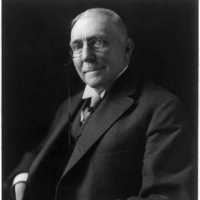An Out
How tired I am! I sink down all alone
Here by the wayside of the Present. Lo,
Even as a child I hide my face and moan—
A little girl that may no farther go;
The path above me only seems to grow
More rugged, climbing still, and ever briered
With keener thorns of pain than these below;
And O the bleeding feet that falter so
And are so very tired!
Why, I have journeyed from the far-off Lands
Of Babyhood—where baby-lilies blew
Their trumpets in mine ears, and filled my hands
With treasures of perfume and honey-dew,
And where the orchard shadows ever drew
Their cool arms round me when my cheeks were fired
With too much joy, and lulled mine eyelids to,
And only let the starshine trickle through
In sprays, when I was tired!
Yet I remember, when the butterfly
Went flickering about me like a flame
That quenched itself in roses suddenly,
How oft I wished that _I_ might blaze the same,
And in some rose-wreath nestle with my name,
While all the world looked on it and admired.—
Poor moth!—Along my wavering flight toward fame
The winds drive backward, and my wings are lame
And broken, bruised and tired!
I hardly know the path from those old times;
I know at first it was a smoother one
Than this that hurries past me now, and climbs
So high, its far cliffs even hide the sun
And shroud in gloom my journey scarce begun.
I could not do quite all the world required—
I could not do quite all I should have done,
And in my eagerness I have outrun
My strength—and I am tired....
Just tired! But when of old I had the stay
Of mother-hands, O very sweet indeed
It was to dream that all the weary way
I should but follow where I now must lead—
For long ago they left me in my need,
And, groping on alone, I tripped and mired
Among rank grasses where the serpents breed
In knotted coils about the feet of speed.—
There first it was I tired.
And yet I staggered on, and bore my load
Right gallantly: The sun, in summer-time,
In lazy belts came slipping down the road
To woo me on, with many a glimmering rhyme
Rained from the golden rim of some fair clime,
That, hovering beyond the clouds, inspired
My failing heart with fancies so sublime
I half forgot my path of dust and grime,
Though I was growing tired.
And there were many voices cheering me:
I listened to sweet praises where the wind
Went laughing o’er my shoulders gleefully
And scattering my love-songs far behind;—
Until, at last, I thought the world so kind—
So rich in all my yearning soul desired—
So generous—so loyally inclined,
I grew to love and trust it.... I was blind—
Yea, blind as I was tired!
And yet one hand held me in creature-touch:
And O, how fair it was, how true and strong,
How it did hold my heart up like a crutch,
Till, in my dreams, I joyed to walk along
The toilsome way, contented with a song—
‘Twas all of earthly things I had acquired,
And ’twas enough, I feigned, or right or wrong,
Since, binding me to man—a mortal thong—
It stayed me, growing tired....
Yea, I had e’en resigned me to the strait
Of earthly rulership—had bowed my head
Acceptant of the master-mind—the great
One lover—lord of all,—the perfected
Kiss-comrade of my soul;—had stammering said
My prayers to him;—all—all that he desired
I rendered sacredly as we were wed.—
Nay—nay!—'twas but a myth I worshipped.—
And—God of love!—how tired!
For, O my friends, to lose the latest grasp—
To feel the last hope slipping from its hold—
To feel the one fond hand within your clasp
Fall slack, and loosen with a touch so cold
Its pressure may not warm you as of old
Before the light of love had thus expired—
To know your tears are worthless, though they rolled
Their torrents out in molten drops of gold.—
God’s pity! I am tired!
And I must rest.—Yet do not say 'She _died_,'
In speaking of me, sleeping here alone.
I kiss the grassy grave I sink beside,
And close mine eyes in slumber all mine own:
Hereafter I shall neither sob nor moan
Nor murmur one complaint;—all I desired,
And failed in life to find, will now be known—
So let me dream. Good night! And on the stone
Say simply: She was tired.

